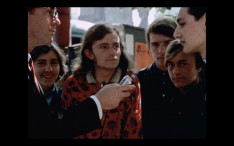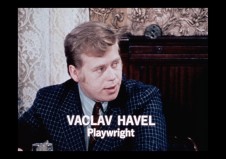Czechoslovakia: Portrait of a Tragedy

Czechoslovakia: Portrait of a Tragedy
The Wende Museum and Los Angeles Filmforum present
Czechoslovakia: Portrait of a Tragedy (1968: Visions of Possibilities, part 7)
Sunday August 19, 2018, 3:00pm
At the Wende Museum, 10808 Culver Blvd., Culver City CA 90230
2:00 pm – Reception in the garden
3:00 pm – Film Screening
Los Angeles premiere! Note the change in time and location!
THIS SCREENING IS NOW AT CAPACITY WITH A LENGTHY WAIT LIST. WE'LL TRY TO REPEAT IT SOON.
Free but please RSVP at https://33506.blackbaudhosting.com/33506/Film-Screening-Czechoslovakia-Portrait-of-a-Tragedy
Produced during "Prague Spring," Czechoslovakia: Portrait of a Tragedy (1968) features rare interviews with historical figures including Ota Šik, drafter of the New Economic Model, and Václav Havel, who more than twenty years later became a leader in the Velvet Revolution and the first president of the Czech Republic. In addition to these prominent figures, the filmmakers sought out a wide range of ordinary Czech citizens who spoke frankly on camera about their struggles, uncertainties, and hopes for sustained political change. Screened only a handful of times upon its release, the film has been essentially lost to the public record for the past fifty years.
Czechoslovakia: Portrait of a Tragedy is in English, with on-screen translation from the Czech provided by the late Rudolf Perina, who served as a research consultant on the production. He would go on to a distinguished career in the Foreign Service, including serving as U.S. Ambassador to Moldova. Mr. Perina’s donation of the film to the Wende Museum made possible its preservation and presentation to a new generation of audiences.
We screen the documentary in honor of Rudolf Perina, who served on the Wende Museum's Council of Advisors, playing a pivotal and inspiring role in the development and growth of the museum. His daughter Kaja Perina will introduce the screening.
Special thanks to the Consulate General of the Czech Republic in Los Angeles and the Czechoslovak Society of Arts and Sciences in Los Angeles for their generous support of this event. The new preservation of Czechoslovakia: Portrait of a Tragedy was completed with support from the National Film Preservation Foundation
1968: Visions of Possibilities: Over the course of the year, Filmforum will present a variety of films reflecting the turbulent global events of 1968, films made in that time, and works reflecting on the long-term effects and disappointments of the activist efforts and violent responses. From the assassinations of Martin Luther King, Jr and Robert Kennedy to the Democratic Convention and 1968 presidential election in the US, to the strikes in France in May and the Prague Spring and Soviet crushing of it, these films of and on 1968 utilize many voices and techniques to show an era that seemed lost but perhaps now cycles back to our consciousness and actions. Series curated by Adam Hyman.
For more information: https://www.wendemuseum.org/programs/film-screening-czechoslovakia-portrait-tragedy www.lafilmforum.org or 323-377-7238

Czechoslovakia: Portrait of a Tragedy
Czechoslovakia: Portrait of a Tragedy
1968, color, 16mm transferred to digital
Los Angeles premiere!
New preservation completed with support from the National Film Preservation Foundation
Notes on Czechoslovakia: Portrait of a Tragedy:
The Wende Museum proudly presents the Los Angeles premiere of the 1968 documentary Czechoslovakia: Portrait of a Tragedy, in a new preservation completed with support from the National Film Preservation Foundation. Screened only a handful of times upon its release, the film has remained essentially lost to the public record for the past fifty years. Production by the U.S. independent Saturday House, Inc. took place over six weeks during the so-called “Prague Spring,” a period of unprecedented political reform in Czechoslovakia that began with the election of Slovak politician Alexander Dubček as First Secretary of the Communist Party of Czechoslovakia in January 1968, and ended abruptly seven months later with the Soviet-led invasion.
At the height of the Cold War and the social unrest of the 1960s, the Prague Spring held out the possibility of democratic reform from within the Soviet-backed system. Its proponents aimed to create “socialism with a human face” through federalization, economic liberalization, and increased freedom of speech and the press. The changes gathered momentum that worried Soviet leader Leonid Brezhnev, despite assurances from Czechoslovakia that it had no plans to break away from the Warsaw Pact. Invoking the “Brezhnev Doctrine,” which allowed the Soviet Union to intervene in Eastern Bloc countries in danger of reverting to capitalism, the Soviets assembled a Warsaw Pact military force. On August 20-21, 1968, troops from the Soviet Union, East Germany, Poland, Bulgaria, and Hungary invaded and occupied Czechoslovakia, signaling the beginning of the end of the attempted reforms.
The film features rare interviews with important historical figures including the economist and politician Ota Šik, drafter of the New Economic Model, and the dissident playwright and political activist Václav Havel, who more than twenty years later became a leader in the Velvet Revolution and the first president of the Czech Republic. In addition to these prominent figures, the filmmakers sought out a wide range of ordinary Czech citizens who spoke frankly on camera about their struggles, uncertainties, and hopes for sustained political change.
Despite containing some of the first in-depth reporting on the Prague Spring, according to Mr. Perina, Czechoslovakia: Portrait of a Tragedy was perhaps overshadowed by interest in the event of the Warsaw Pact invasion itself, rather than the conditions that precipitated it. The Soviet-led invasion (which happened after principal photography but before the completion of postproduction on the film) forms a poignant coda in Czechoslovakia: Portrait of a Tragedy, since the interviews reflect an overall sense of possibility and optimism rather than any foreboding of the imminent suppression of the Prague Spring that would follow in a few short months. -Kate Dollenmayer, 2018
